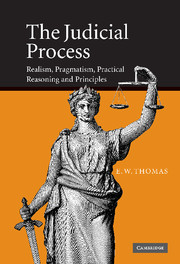Book contents
- Frontmatter
- Contents
- Preface
- 1 Introduction
- 2 Muddling along
- 3 The ‘curse’ of formalism
- 4 Legal fundamentalism
- 5 The idolatry of certainty
- 6 The piety of precedent
- 7 The foibles of precedent – a case study
- 8 There is no impersonal law
- 9 So, what is the law?
- 10 The constraints on the judiciary
- 11 Towards a new judicial methodology
- 12 Of realism and pragmatism
- 13 Of … practical reasoning and principles
- 14 Taking law seriously
- 15 A theory of ameliorative justice
- Subject index
- Authors index
8 - There is no impersonal law
Published online by Cambridge University Press: 15 July 2009
- Frontmatter
- Contents
- Preface
- 1 Introduction
- 2 Muddling along
- 3 The ‘curse’ of formalism
- 4 Legal fundamentalism
- 5 The idolatry of certainty
- 6 The piety of precedent
- 7 The foibles of precedent – a case study
- 8 There is no impersonal law
- 9 So, what is the law?
- 10 The constraints on the judiciary
- 11 Towards a new judicial methodology
- 12 Of realism and pragmatism
- 13 Of … practical reasoning and principles
- 14 Taking law seriously
- 15 A theory of ameliorative justice
- Subject index
- Authors index
Summary
A shout from the rooftops
Let it be shouted from the rooftops; there is no impersonal law distinct from the law that judges have made and will yet make. Once it is accepted that there is no impersonal law it must also be accepted that there is no ‘right’ answer. As there is no impersonal law it is immature for judges to keep thinking and behaving as if there were such an impersonal law. Similarly, as there is no ‘right’ answer, it is equally immature to keep thinking and behaving as if there were a ‘right’ answer. Judges can do no more than harness and manage their intelligence and capabilities so as to provide the best answer possible in the circumstances of the case. As an increasing number of judges obtain a sound conception of the judicial role, the best answer, I believe, will be one that seeks to render justice in the individual case and meet the contemporary needs and expectations of society.
The notion that there is an impersonal law crumbles once it is accepted that there is no law hovering in the heavens waiting to be declared and that, in fact, judges constantly make and remake law. As society is in a constant state of flux so, too, the law is constantly in motion as judges, or some judges, strive to keep abreast of society's needs and expectations. This process, as already observed, represents the irrevocable dynamic of the common law.
- Type
- Chapter
- Information
- The Judicial ProcessRealism, Pragmatism, Practical Reasoning and Principles, pp. 184 - 216Publisher: Cambridge University PressPrint publication year: 2005

